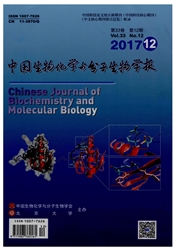

 中文摘要:
中文摘要:
肿瘤坏死因子相关凋亡诱导配体(tumor necrosis factor-related apoptosis-inducing ligand,TRAIL)对癌细胞有独特的细胞毒性作用,而对正常细胞没有影响.但乳腺癌细胞耐受TRAIL诱导凋亡.本研究探索磷脂酰肌醇-3激酶(phosphatidylinositol 3-kinase,PI3K)信号通路对人乳腺癌MCF-7细胞耐受TRAIL的影响.采用MTT法、显微照相以及DAPI染色观察TRAIL对MCF-7细胞生长的抑制作用以及诱导细胞凋亡状况;流式细胞分析细胞凋亡的情况;激光共聚焦显微镜观察多聚ADP核糖多聚酶-1(poly(ADP-ribose)polymerase-1,PARP-1)的迁移和定位;Western印迹分析死亡受体、caspase-3/8、磷酸化的AKT[pAKT(Ser473)]、Src和PARP-1等蛋白质表达.结果显示,小剂量TRAIL(〈80 nmol/L)和Ly294002(〈40μmol/L)对MCF-7细胞生长没有显著的抑制作用,但是大剂量TRAIL(160 nmol/L)和Ly294002(80μmol/L)则能抑制MCF-7细胞生长;低剂量Ly294002协同TRAIL抑制MCF-7细胞生长,并诱导细胞凋亡;Ly294002和TRAIL共同作用能促进PARP-1从胞浆进入细胞核;蛋白质表达分析显示,MCF-7细胞均表达死亡受体DR4、DR5、诱骗受体DcR1和DcR2、以及caspase-8,但是不表达caspase-3;Ly294002和TRAIL共同作用也能抑制pAKT(Ser473)和Src的表达,并且导致PARP-1断裂.本研究结果提示,抑制PI3K信号可增加MCF-7细胞对TRAIL诱导的敏感性;MCF-7细胞通过PI3K/AKT途径促进Src的表达耐受TRAIL的细胞毒性作用;Ly294002联合TRAIL是一种新的药物组合方式治疗乳腺癌.
 英文摘要:
英文摘要:
Tumor necrosis factor-related apoptosis-inducing ligand (TRAIL) is a member of the tumornecrosis factor (TNF) superfamily and has been shown to induce extrinsic pathway of apoptosis in manytypes of cancer cells, but in breast cancer MCF-7 cell it displayed resistance to cytotoxicity of TRAIL.This investigation aim to study the effect of phosphatidylinositol 3-kinase (PI3K) signal pathway on MCF-7 cells resisted the cytotoxicity of TRAIL. Human breast cancer MCF-7 cells were treated with TRAIL orLy294002 alone/in combination. MTT cell viability assay was used to evaluate growth of the ceils. Forshowing the change of morphology and nucleolus in MCF-7 cells, both microscopical photograph and 4,6-diamino-2-phenylindole(DAPI) stained detects were performed. Flow cytometry was applied to analyzethe apoptosis of the cells; Laser confocal microscopy was applied to observe location and migration of poly(ADP-ribose) polymerase -1 ( PARP-1 ) and Western blot analysis was conducted to evaluate DR4, DRS,DcR1, DcR2, caspase-3/8, Src and pAKT(Ser473) protein levels. The results indicated that sequentialtreatment of small dose of Ly294002 (〈40 μmol/L) or TRAIL ( 〈80 nmol/L) had little suppressiveimpact on the growth, but Ly294002 (80 μmol/L) or TRAIL( 160 nmol/L) significant inhibited theproliferation of MCF-7 ceils. Pretreated with Ly294002 (20μmol/L) followed treated with TRAIL (40nmol/L) resulted in significant synergistic cytotoxicity and apoptosis, suggesting that MCF-7 ceils wereunder strong apoptotic stimuli. Western blot assay showed that MCF-7 expressed DR4, DR5, DcR1,DcR2, caspase-8. Pretreatment of MCF-7 cells with Ly294002 (20 μmol/L) and followed treat withTRAIL (40 nmol/L) not only promoted PARP-1 to enter cytoblast, but also suppressed the expression ofSrc and pAKT (Ser473) in the cancer cells. These findings strongly suggest that inhibition of PI3K/AKTsignal enhances sensitivity of MCF-7 ceils to TRAIL; MCF-7 cells resistance the apoptosis in
 同期刊论文项目
同期刊论文项目
 同项目期刊论文
同项目期刊论文
 HBx induced AFP receptor expressed to activate PI3K/AKT signal to promote expression of Src in liver
HBx induced AFP receptor expressed to activate PI3K/AKT signal to promote expression of Src in liver Alpha fetoprotein activates AKT/mTOR signal to stimulate expression of CXCR4 and migration of hepato
Alpha fetoprotein activates AKT/mTOR signal to stimulate expression of CXCR4 and migration of hepato Hepatitis B virus X protein induces expression of alpha-fetoprotein and activates PI3K/mTOR signalin
Hepatitis B virus X protein induces expression of alpha-fetoprotein and activates PI3K/mTOR signalin Inhibited The Activity of PTEN by alpha-Fetoprotein Caused Resistance to all trans Retinoic Add of H
Inhibited The Activity of PTEN by alpha-Fetoprotein Caused Resistance to all trans Retinoic Add of H Alpha fetoprotein is a novel protein-binding partner for caspase-3 and blocks the apoptotic signalin
Alpha fetoprotein is a novel protein-binding partner for caspase-3 and blocks the apoptotic signalin 期刊信息
期刊信息
